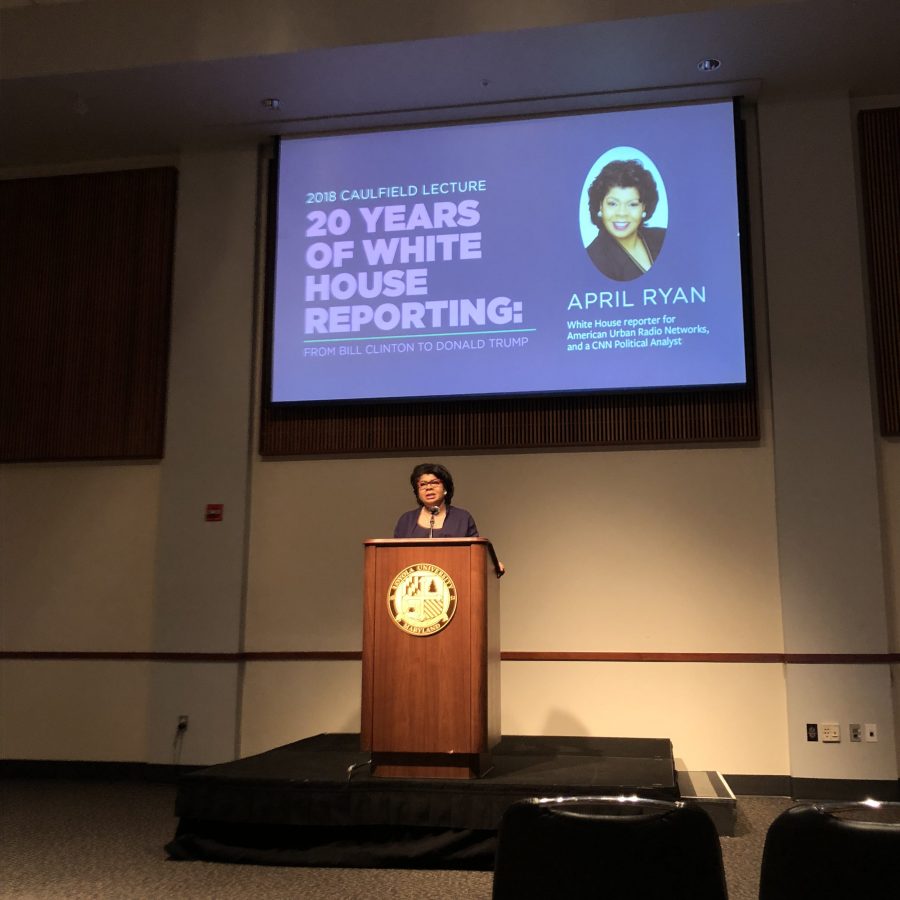On April 19, the Department of Communication hosted April Ryan as their guest speaker for the 2018 Caulfield Lecture titled, “20 Years of White House Reporting: From Bill Clinton to Donald Trump.” Celebrating its 29th year, the Caulfield Lecture was founded and supported by the family of Clarence J. Caulfield, an editor for the Baltimore Sun for over 20 years and a 1922 alumnus of Loyola.
Ryan, a Baltimore native and graduate of Morgan State University, is the White House correspondent for American Urban Radio Network and newly a CNN political analyst, = She is also the award-winning author of “The Presidency in Black and White”, “At Mama’s Knee”, and the upcoming “Under Fire: Reporting from the Front Lines of the Trump White House”. Working in the White House since the Clinton administration, Ryan holds the position as the only black female reporter to cover urban issues. Talking about working in a white-male-dominated field, Ryan recalls that “it’s not a small feat to be in the position I’m… [having] the opportunity to question four presidents.”
She began her talk by stating how important it is to report and discuss in “a time such as this,” a phrase she repeated numerous times. Ryan talked about how she started in an era where there wasn’t a lot of media, but now people can get news from various mediums, and more young people than ever are involved in the political process.
“This is the newsiest time ever,” said Ryan. “We have a President who’s never been someone in governance, and Twitter is an official statement.”
She talked about modern issues that the press faces in America, discussing how the press has been around since America’s inception but is now experiencing widespread issues related to recent attacks on the media made by President Trump. Ryan brought up Fox News’ Sean Hannity, who allegedly has a close relationship with the President crafting stories for him and then reporting back on it. On this point, Ryan reminded us that “journalists aren’t supposed to be the news . . . they’re supposed to be the accountability piece for the White House.”
Ryan received a round of applause when she talked about her strong belief in freedom of the press. “When you suppress the press, you begin a dictatorship,” said Ryan. In the end, the press’ job is to get information out to the people, but so many stories are left behind because of sensationalism.
Ryan discussed her time working through different administrations, and how each brought their own agenda and history. “These last two, however,” said Ryan. “Brought something that sets them apart from the priors.” Each talked about change, and each touched one group while leaving some behind. President Obama was the first president to begin using social media to communicate with the public, and now President Trump mainly communicates through it.
The most important advice she gave was to pay attention and listen to the people, because “we’ve never seen anything like this”.
“We’re so used to instant gratification,” said Lydia Pritchard, ‘18. “And with it comes a sense of having information in a perfectly packaged way: unbiased, without any blemishes, and completely factual. And that’s often not the case with what you get. We need to focus on the facts and doing extra research to know if it’s actually true.”
Ryan said that in 21 years, she’s found that people don’t realize the power they have. “It’s we the people,” said Ryan. “It’s not one person, one president, or one governor. You have to understand that it’s about what you think and feel.”
She pointed out that the Women’s March started when a couple women said, “We’re mad,” and their actions turned into a nationwide movement. Ryan asked the audience if the time we were in now was where we wanted to be, and reminded them that they were at Loyola to challenge institutionalism.
Ryan also emphasized her reporting style. “I can’t bridge the gap but I want people to hear all sides of the situation. I want to hear your truth and put it out there.” She stated that this is important because if you shut one side off they’ll still impact you, but you won’t know what happened.
Emma Maloney ’20 said, “I assumed that reporters were biased and wouldn’t accept different opinions. But everyone has an opinion and I like that she respects them. It’s not about being wrong; it’s about reporting what someone’s truth is.”
“I think it’s wonderful that Loyola is able to come up with the resources to have people who are so knowledgeable in the Communications field. For students like us, and even professors, it’s important to hear from someone who has had so much experience,” said Pritchard. “It also gives us the inspiration to know that we can do something like this. Race or gender don’t hinder us, and I think young people especially need to hear. I think that her coming to campus was very timely.”

















































































































john • Jul 13, 2018 at 10:34 pm
thanks